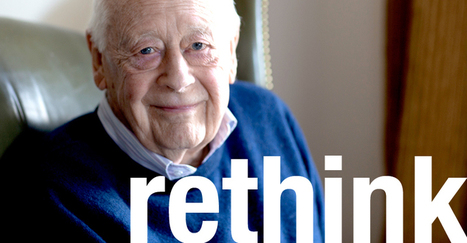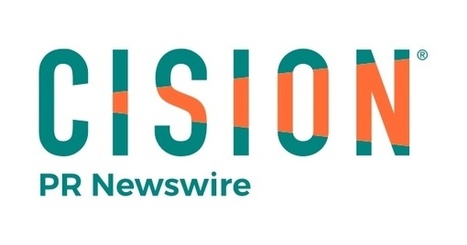The task I have set for myself is to combine in a coherent way three interlacing strands of future oriented thinking: futurology, eschatology, and ethics. The ethical task of the present generation, as I see it, is to project future visions of a just and sustainable global community and then enlist present resources to turn that vision into actuality. …
Research and publish the best content.
Get Started for FREE
Sign up with Facebook Sign up with X
I don't have a Facebook or a X account
Already have an account: Login
 Your new post is loading... Your new post is loading...
 Your new post is loading... Your new post is loading...

David Cooperrider & Audrey Selian 's curator insight,
November 27, 2019 3:55 PM
The business philosopher Charles Handy, a little more than a year ago, called for a business reformation--a revolution really. He used to think that the answer to building more fully human organizations--businesses that also nurture life and nature--might be a charter for humanity to be used as a guide to organization.
But what we really need he argued is a transformational business reformation. We need to rethink how organizations, particularly businesses, are actually run, why they are run, and what their purpose and role are in society. We need to figure out how to keep human values intact inside the corporation and how business enriches, nourishes, and replenishes society and ecosystems . And if that seems ambitious, consider, says Handy, the achievement of Martin Luther – one person on his own. And not just Luther. In 1970 Milton Friedman took it on himself to announce that the only purpose of a business was to make a profit. That’s how, argues Handy, we arrived at shareholder value (a phrase previously unknown), followed by agency theory, the idea of a corporation as a nexus of contracts, and stock options, eventually legalized by Congress. And now, a swamp of buyback shares, trillions of dollars going into the private equities of some of the senior managers. This too was a revolution – an unwelcome one, but a revolution nonetheless.. So where do we find another leader? One who will lead our reformation? Well, says Handy: "Let me follow another Martin Luther and share a dream. Couldn’t the modern Wittenberg be the Peter Drucker Global Forum? And the Luther of our time be Peter Drucker? With his words from the grave magnified … by all of us. And exemplified by putting our words into practice. If people criticize, we have to be bold, like Luther, and say: here I stand, I can do no other, because this is the right way to behave. So don’t ask for leaders. It’s up to us to start small fires in the darkness, until they spread and the whole world is alight with a better vision of what we could do with our businesses. If not us, then who? if not now, then when?"

David Cooperrider & Audrey Selian 's curator insight,
July 18, 2019 4:44 PM
By 2030 the circular economy is estimated to be worth $4.5 trillion in positive economic output. But what if that’s an underestimate—ask the journalists at Green Biz? For the last three years, Google has been working to make circular principles a reality across infrastructure, operations, and products, from data center servers to food waste in its cafes. But what does it take for a company with Google’s scale and complexity to become a circular business? And can technology speed our journey to a circular future? Kate Brandt, in this visionary but totally pragmatic talk, discusses the global tech company’s plans to transform Google, and offer others the chance to do the same, as the circular economy becomes reality. Every Google search or YouTube upload costs the global network both energy and resources. As Google's head of sustainability, it's Kate E. Brandt's job to strategize solutions that cut the cost on our environment and our economy. In an innovative talk, she dives into her plan to green up Google by creating a circular economy which reuses, recycles and eliminates waste altogether. Kate Brandt has always been an overachiever. Two-sport athlete. Voted most likely to succeed in high school. An Ivy League graduate. So, it’s not surprising that at 34 she’s charged with turning Google into the world leader in environmental practices. Kate Brandt leads sustainability across Google’s worldwide operations, products and supply chain. In this role, Kate partners with Google’s data centers, real estate, supply chain, and product teams to ensure the company is capitalizing on opportunities to strategically advance sustainability and circular economy. Previously in 2014 President Obama appointed Kate to serve as the Federal Environmental Executive and under EO 13693 she became the Nation's first Federal Chief Sustainability Officer. In this capacity, she was responsible for promoting sustainability across Federal Government operations including 360,000 buildings, 650,000 vehicles, and $445 billion annually in purchased goods and services. Prior to the White House, Kate held several senior roles in U.S. Federal Government including Senior Advisor at the Department of Energy, Director for Energy and Environment in the White House Office of Presidential Personnel, and Energy Advisor to the Secretary of the Navy. Kate is the recipient of the Distinguished Public Service Award, the highest award the U.S. Navy can give to a civilian, for her work helping the Navy go green. Outside Magazine named her as one of 40 women who have made the biggest impact on our world and Forbes listed her among the top 46 sustainability leaders in 2018. Kate serves on the boards of BSR, The Institute at Brown for Environment and Society, The Roosevelt Institute, Planet Forward, Stanford International Affairs Network, NSF Committee for Environmental Research and Education, and the Corporate Eco Forum. Kate received a Masters degree in International Relations from the University of Cambridge where she was a Gates Cambridge Scholar. She graduated with honors from Brown University.
|
|
































